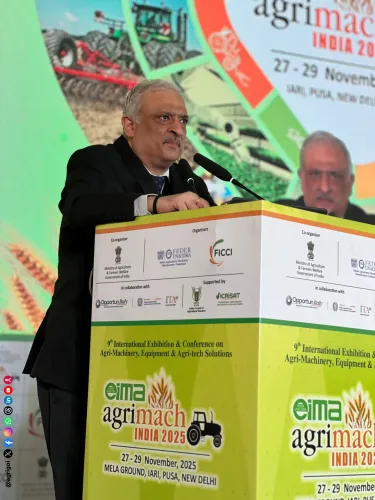How Will E-commerce Export Hubs Reduce Logistics Costs for Indian SMEs?

Synopsis
Key Takeaways
- E-Commerce Export Hubs aim to lower logistics costs for SMEs.
- Integrated services will streamline customs clearance and packaging.
- Partnerships with global platforms enhance export readiness.
- Trade Connect ePlatform provides critical trade information.
- Over 1,000 Dak Ghar Niryat Kendras offer documentation support.
New Delhi, Aug 5 (NationPress) The E-Commerce Export Hubs (ECEHs) initiative is designed to create specialized zones that will lower both the costs and time related to logistics while streamlining regulatory procedures, as announced by the government on Tuesday.
These hubs are set to enhance cross-border e-commerce exports from India and facilitate the re-importation of e-commerce returns or rejects. Minister of State for Commerce and Industry, Jitin Prasada, detailed that five pilot ECEH projects have been proposed for execution in a written response to the Lok Sabha.
ECEHs will provide integrated services at a single location, encompassing customs clearance, quality certification, packaging, and off-port warehousing.
Some of the suggested ECEHs will be executed directly by logistics service providers to ensure cohesive delivery of warehousing, packaging, and regulatory support. The government has also established Memoranda of Understanding (MoUs) with significant stakeholders, which include global e-commerce platforms and domestic logistics firms, as informed by the minister.
These partnerships are intended to foster awareness, boost export readiness, and encourage cross-border e-commerce, particularly for MSMEs. Regional DGFT authorities have initiated outreach and capacity-building programs with these entities to assist SME sellers and help them navigate export procedures.
In response to another inquiry, the Centre disclosed the measures taken to simplify customs, logistics, and compliance procedures for small exporters, especially in relation to e-commerce exports.
The Trade Connect ePlatform was unveiled to provide small exporters with access to international trade-related information. This platform integrates data from Indian Missions, Export Promotion Councils, and Commodity Boards, as mentioned by the minister.
In collaboration with CBIC, the Department of Posts has set up Dak Ghar Niryat Kendras (DNKs) to support exporters with documentation, packaging, and regulatory compliance, with a total of 1,013 DNKs now operational. The International Tracked Packet Service spans 41 countries, offering volume-based discounts for small exporters, as stated in the reply.
The Reserve Bank of India has suggested procedural relaxations for small-value exporters under the Export Data Processing and Monitoring System (EDPMS). Authorised Dealer (AD) banks are now permitted to close shipping bills up to Rs 10 lakh based on quarterly declarations from exporters.









